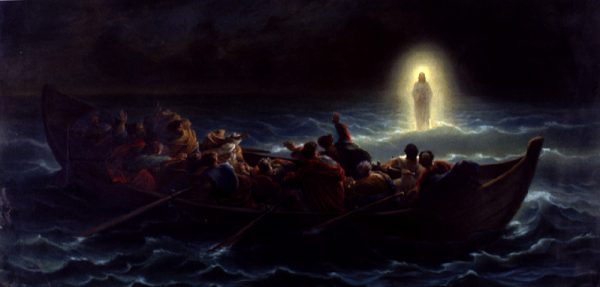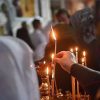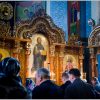Today’s Gospel reading recounts to us a miracle that occurred after Jesus went up alone to the temple to pray. He spoke to the Father, imploring Him and praising Him. He was alone in prayer. Before this, he had left the boat on the Sea of Tiberias and walked on the water. When the disciples saw Him walking on the water, they were disturbed and said that he was a phantasm, crying out in fear.
It is normal and expected for us to fear, since we are subject to the vicissitudes of time, to war and to death. We fear each other and we fear things that happen to us from outside. No matter which war or which death, there is a tempest within us because we sense life’s pleasures and seek them. They cause tempests in our soul. They increase and strengthen the attractiveness of this world, even if the Lord passes before us in our mind, in our prayer, in our conscience, we consider Him to be a phantom also, like these winds that beset us.
What really is a sinner’s stance toward God? Deep down, what does it mean for us to live in sin, for us to practice a specific sin day after day, for months or years or an entire life? It means that God has become a phantasm for us. That is, that He does not rule, He is not Lord over our soul. It is in the sinner’s own self-interest to turn God into a phantasm, since if he regarded Him as being truly present, then God is ruling and I am subject to Him, obedient before Him. Every sinner turns God into a ghost that he exploits, lest God have dominion over him.
If we closely examine the sin within us, we will go to the priest and say, “Read to me the prayer of absolution and place the epitrachelion over my head,” and we think that things pass this simply. If we do not feel that our sins are something terrifying, a deadly tempest, then this means that we do not have knowledge of Jesus Christ. This means that we have not seen Him. If we do not fear a small lie more than we fear war, then we have not seen Jesus Christ. We still fear for our bodies without fearing for our souls, that they be soiled, that they be killed, that our conscience be bought and sold in vain.
The sinner makes God into a phantasm because God rules and the sinner does not want God to rule over him. When Jesus said to the disciples, “Do not fear,” they saw that the whole of the Sea of Tiberias was nothing, and that He was not sinking. They saw that Christ is the sea, that He is the mountain, that He is the stars and the sun and the sky. Thus, when Peter forgot that the sea was a sea, when he did not feel that the storm was a storm, and when he stopped understanding that he would sink because the sea no longer existed, the universe no longer existed and Christ became the universe, he said to the Lord, “Let me come to You upon the water” and he walked on the water.
But grace does not last forever. Peter denied his Lord, just as he would deny Him later. He disbelieved, just as he would disbelieve after the Transfiguration. He once more became a man of flesh and blood. Jesus did not want any of us to remain of flesh and blood or of man’s lust, but rather for us to be of God. Peter once more saw that there is a sea, that there is a storm, that there is a world and that there is a universe, so he sank in the Sea of Tiberias. That is, he sank in the world.
Then Jesus entered the boat. That’s how the story goes. That’s how our story goes. The boat of life that each one of us boards comes and goes until the Lord enters it. It is as though Saint Matthew says, “You, O Christians, are liars. You go to a great house that you call a church but you do not go to God because you have erased God from your life.” This is an image of the situation for most people until the Lord enters the boat. That is, until we accept Him and become His disciples. Then there is no longer a storm that disturbs us. We do not fear impending death, nor do we lose our minds if we lose a relative. We do not fall terribly because we have sinned, but rather we return to the face of God. We have been reading for days in the Gospel that His face became like the sun, so we return to this sun to be enlightened, to rest, to become masters of ourselves, giving praise and drunk on Christ.

















